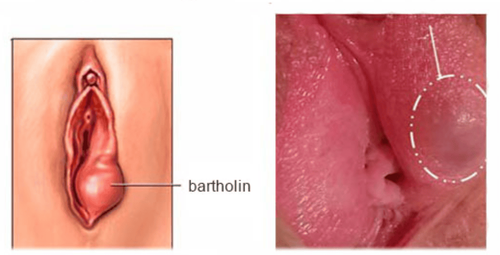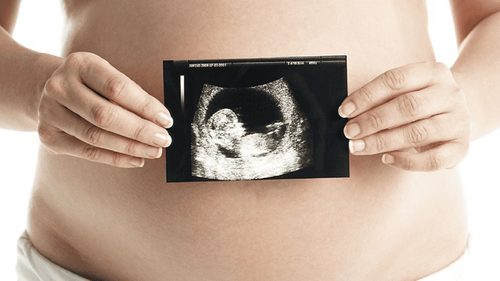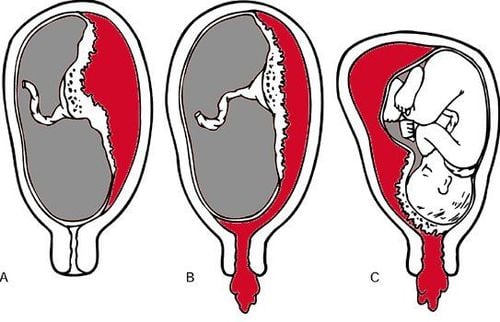This is an automatically translated article.
The article is professionally consulted by Dr., Doctor Ngo Thi Uyen - Obstetrician and Gynecologist - Department of Obstetrics and Gynecology - Vinmec Nha Trang International General Hospital.Pregnancy with multiples is considered a joy for most women. However, pregnant women carrying multiples have to be even more cautious because of the increase in dangerous complications during pregnancy. So what are the signs of a multiple pregnancy and what are the possible risks? Find out through the following article.
1. What is multiple pregnancy?
A woman with multiple pregnancy means that during pregnancy, two or more fetuses grow together in the mother's womb. Multiple pregnancy may be due to the fact that more than one follicle (ovum) was previously released during a woman's menstrual cycle and each ovum was fertilized with one sperm, resulting in multiple embryos and fetuses. develop together in the uterus. This type of insemination will result in multiple pregnancies with different ovum (different ovum).
In the case when one ovum is fertilized, then splits to form many identical embryos that will give birth to identical babies, called multiple ovum (same ovum). Identical twins are less common than fraternal twins.
2. Causes of multiple births
The use of fertility drugs to induce ovulation can cause more oocytes to be released from the ovary and lead to twins, triplets,... In addition, in vitro fertilization (IVF) has possibility of multiple pregnancy if more than one embryo is inserted into the woman's uterus. Signs of a multiple pregnancy can also occur if the fertilized ovum then splits into multiple embryos after implantation.
Besides, women over the age of 35 are more likely to release two or more ovules in one menstrual cycle. This possibility is much lower than in young women. Therefore, the rate of multiple pregnancies is usually higher for older pregnant women.
3. Signs of multiple pregnancy
Women carrying multiple pregnancies often have heavier morning sickness and more painful breasts than women with singleton pregnancies. In addition, a sign of multiple pregnancy can also be weight gain, often faster than a normal pregnancy. Most cases of twins and triplets are detected during an ultrasound.
4. Pregnant with multiples need more energy?
Usually, women carrying multiples need more energy than a single pregnancy. Specifically, on average, pregnant women need 300 extra calories per day for each fetus.For example, if you are pregnant with twins, that means you need an extra 600 calories per day (for 2 babies). For triplets and more, energy needs need to be individualized.
5. Should you exercise if you are pregnant with multiples?
Maintaining exercise during pregnancy is very important for the health of women carrying multiples. However, excessive exercise should be avoided. Do light exercise, such as walking, swimming, pregnancy yoga.
You should maintain 30 minutes of exercise every day. If problems arise during your pregnancy, you should probably avoid exercise.
6. Is multiple pregnancy dangerous?
The risk of dangerous complications is often higher for women carrying multiples. You need to go to antenatal care more often. Starting in the second trimester, your doctor will ask you to have an ultrasound every 4-6 weeks.If a problem is suspected in the fetus, the pregnant mother will have to do special tests, such as a Non-Stress Test (NST), or a biophysical profile (BPP) and perform an ultrasound negative more often.
7. The most common complication of multiple pregnancy
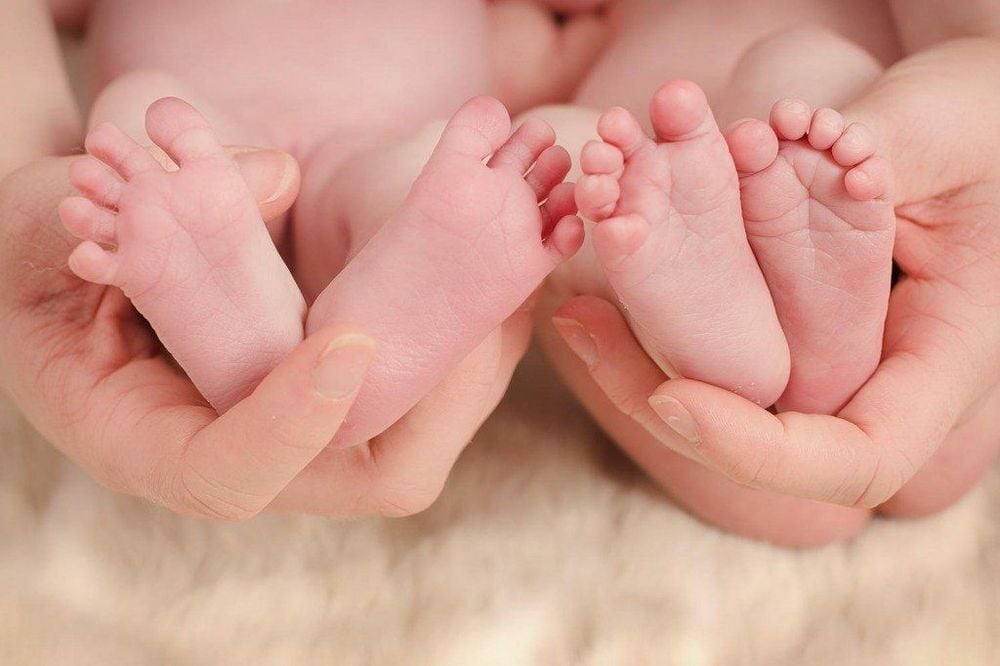
The most common complication of multiple pregnancy is preterm birth. More than half of pregnancies with twins are premature. For triplets, they are almost always born prematurely.
Babies born before 37 weeks of age are at increased risk for both short-term and long-term health problems, including problems with breathing, digestion, and temperature regulation. Some abnormalities may appear later, such as cognitive and behavioral deficits.
Babies born before 32 weeks of pregnancy can die or have serious health problems, even with optimal medical care. Cerebral palsy associated with preterm birth is also more common in twins or triplets.
8. The influence of multiple pregnancy on the health of mother and baby
8.1. Risk of preeclampsia
Preeclampsia is a dangerous condition related to blood pressure, usually starting after 20 weeks of pregnancy or after giving birth. This condition occurs more often in a multiple pregnancy. Even more dangerous, pre-eclampsia also tends to come earlier and is more serious for pregnant women with twins, triplets,...
This disease has the potential to damage one or more organs in the body. friends, most commonly the kidneys, liver, brain and eyes. Preeclampsia can progress to eclampsia, which can cause life-threatening seizures. When severe preeclampsia, eclampsia occurs during pregnancy, babies may need to be born right away, even if they are not fully developed.
8.2. Risk of gestational diabetes
Women carrying multiples have a higher risk of gestational diabetes than those carrying a singleton pregnancy. It increases the risk of pre-eclampsia and potentially causes type II diabetes after birth. As a result, babies can have breathing problems and have low blood sugar. Diet, exercise, and medication can reduce the risk of this complication.
8.3. Risk of fetal growth disorder
Twins and triplets often have growth problems. Multiple pregnancies can be uneven when one fetus is much smaller than the other. Restricted fetal growth can also be caused by an increased risk of infection, twin-to-twin transfusion syndrome, or a problem with the placenta and umbilical cord.
If it is suspected that the babies are growing slowly, pregnant women with multiples can perform regular ultrasounds to monitor the growth of the fetus.
8.4. The risk of a woman with multiple pregnancies having to have a cesarean section
The risk of pregnant women having to have a cesarean section is often higher when carrying multiples. In some cases, twins can still be delivered vaginally. The following factors help the doctor determine the mode of delivery of the mother:
Number of babies, position, weight and health of each baby. The health of pregnant women and the state of labor during childbirth Experience of the medical team
8.5. Postpartum depression risk
Women carrying multiples have an increased risk of postpartum depression. If you're constantly feeling sad, anxious or hopeless, keeping you from performing daily tasks, it could very well be a sign of postpartum depression.
9. Genetic disorder screening test for women carrying multiples
Screening tests for genetic disorders using maternal blood samples (serum screening tests) are generally not sensitive for multiple pregnancies. Accordingly, screening results are often positive even if there is no problem in the fetus.
Diagnostic tests for birth defects in the fetus, including chorionic villus sampling (CVS) and amniocentesis, are often more difficult to perform for women carrying multiples.
10. Breastfeeding problems when pregnant with multiples
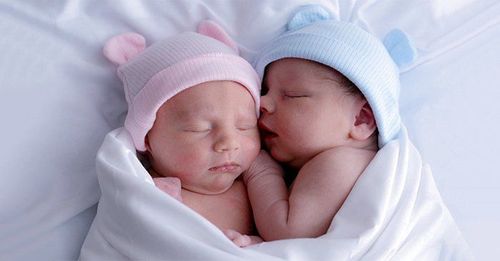
Please dial HOTLINE for more information or register for an appointment HERE. Download MyVinmec app to make appointments faster and to manage your bookings easily.
Mothers with multiple pregnancies after giving birth can breastfeed normally but need to exercise and consult an obstetrician-gynecologist. Mother's milk supply will increase with the number of babies. However, postpartum mothers need a healthy, scientific diet and supplement with many liquid drinks.
In fact, multiple pregnancy is a blessing but also brings many risks for both mother and baby. In all cases, the safety of mother and baby is always the most important goal. Therefore, once the signs of multiple pregnancy have been identified, the pregnant mother must work with her doctor to make a pregnancy plan so that the time of delivery can take place safely and best.
Maternity package at Vinmec International General Hospital supports pregnant women from before - during and after birth. When registering for a package maternity program, pregnant women will be monitored and examined by qualified doctors. The mother will be followed up by obstetricians and gynecologists, and the staff will call regularly before the scheduled appointment, ultrasound and test.
Regular check-ups will help detect fetal abnormalities early, especially in the case of multiple pregnancies. Pregnant women will have periodic ultrasounds, 3D/4D ultrasounds to screen for fetal malformations at important weeks such as week 12, week 18, week 32... Depending on each maternity package, pregnant women can also do pregnancy tests. blood tests, urine tests, Double test, Triple test... support detecting abnormal signs.
At Vinmec, the ultrasound system, modern medical equipment, along with the experience of doctors, will screen and detect early problems and pathologies such as: placenta, slow fetal growth. , pyelonephritis, knotted umbilical cord,... Specific cases will be planned for treatment, combining specialties to help pregnant women have a safe and healthy pregnancy.
Please dial HOTLINE for more information or register for an appointment HERE. Download MyVinmec app to make appointments faster and to manage your bookings easily.
Reference source: Acog.org



